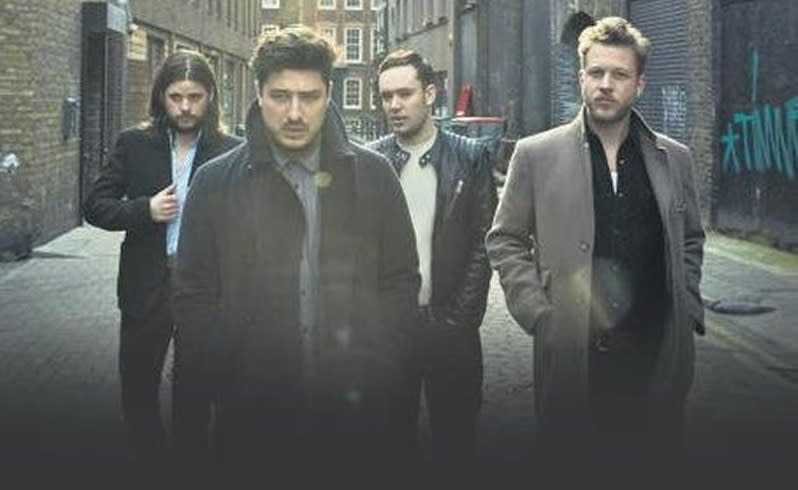Sons have a blast
What, no banjo?
That sums up the global music industry’s collective response in March, when UK folk-rockers Mumford and Sons dropped Believe, the first single from their third album, Wilder Mind, released today.
“Mumford and Sons go electric,” was the headline, as critics and fans marvelled that the band behind string-pluckin’ smash hits I Will Wait, The Cave and Triple J Hottest 100 winner Little Lion Man has done a Dylan and plugged in their guitars.
“We didn’t realise how deep-seated the perception was,” uber-polite multi-instrumentalist Ben Lovett says from London, where Mumford were three days into rehearsals for their US tour starting June 2.
“That’s why we never fought too hard against (being) what people referred to as a folk band,” the 28-year-old born in Cardiff, Wales continues. “We always saw ourselves as a rock band in our ethos but a folk band in the sense that folk is a real storytelling genre. It always sets the scene and gives you a narrative.”
Lovett reveals the quartet were “pleasantly surprised” by how much they enjoyed brushing up on material from their acoustic albums, 2009’s Sigh No More and 2012’s Grammy Award-winning Babel.
“We played Little Lion Man yesterday for the first time in two years,” he says, adding that the old and new material will make for a “a really varied set”.
Perhaps Lovett is being coy about the band not realising the new stadium rock sound of Wilder Mind would raise eyebrows.
After all, the hugely popular video for Hopeless Wanderer — the fifth and final single lifted off Babel — parodied the Englishmen’s folksy image with comedians Jason Batemen, Jason Sudeikis, Will Forte and Ed Helms filling in for the band members (the latter portraying Lovett).
The clip seemed a light-hearted rebuttal to UK blues-rock upstart Jake Bugg’s dismissal of Mumford and Sons as “posh farmers with banjos”; a swipe at the fact Lovett met frontman Marcus Mumford at the exclusive King’s College School in Wimbledon.
Lovett maintains that other people’s perceptions did not prompt their 180 degree shift on Wilder Mind. “It didn’t feel like that was a massive burden on us as we were making it,” he says. “I think that’s how people should make records, not designed to please.”
After the heavy touring for Babel ended in late 2013, the four band mates — Lovett, Mumford, Winston Marshall and Ted Dwane — spent five months apart.
“We were in contact but we were very much getting on with our personal lives and writing songs away from each other,” Lovett explains. “I guess whatever happened during that phase was the seed that grew into this album.”
Driving rock songs such as The Wolf and Ditmas best epitomise the fresh direction. The latter refers to Ditmas Park, the Brooklyn neighbourhood where the quartet demoed songs in the studio owned by Aaron Dessner from US alternative rock titans the National.
“It feels like they’ve always been an influence,” Lovett says, “but not as explicitly as on this record.”
Elsewhere autobiographical songs, such as Monster and Snake Eyes, lead Mumford and Sons into darker, more introspective territory.
The band unveiled the new songs at an intimate showcase at famed LA club the Roxy in late March.
“The rocking stuff, like The Wolf, feels more punky and trashy — it feels like a pretty wild thing to be doing in a small room,” Lovett says.
“Then there’s Tompkins Square Park and Wilder Mind, those songs feel like they don’t necessarily rally the big crowds and there’s a bit more space in the music.”
Speaking of rallying big crowds, the Mumford mainstay is grateful for the enormous support Australia and, in particular, local label Dew Process has given his band since they released debut single Little Lion Man in 2009.
“Without Australia getting behind what we were doing, I don’t think we would’ve been afforded the chance to do it anywhere,” says Lovett, a passionate “music geek” who launched the Communion emerging artists label around the same time as Mumford and Sons began.
“We were doing the same songs in pubs in the UK and it wasn’t much more than that. We went out and supported Laura Marling in the US — first on with a 20-minute set — and nothing really happened.
“It wasn’t until we went to Australia that people were en masse into it.”
Of course, the love hasn’t always been unconditional. After their most recent WA performance at Belvoir Amphitheatre in 2012, a fan snuck backstage and stole the band’s expensive customised in-ear monitors.
“They ended up getting returned with an apology,” Lovett laughs. “Classic. I think he’d had a few too many drinks and thought it was funny, then woke up the next day with a bunch of monitors that he couldn’t use and sheepishly returned them.
“I think that sums up one part of the Australian demographic.”
Mumford and Sons will return to Australia later this year on the global touring accompanying the release of Wilder Mind.
Refreshed by the five-month break before recording their latest opus, Lovett says the four English gents have always managed to take time off right when they need some.
“It’s a passion project, so if we go out and play songs that were built on passion, built on truth and we can’t deliver them 100 per cent, it really doesn’t work,” he says.
“We’re not the sort of band that can go out there and knock through it and detach ourselves.”
Wilder Mind is out now.



